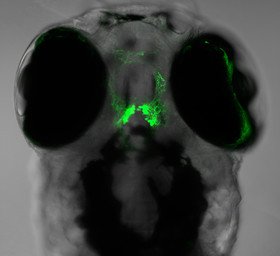Our orgasms daily work lots of time in sleep and that sleep deprivation can have disastrous effects ultimately leading to death, demonstrate the importance of sleep. For a phenomenon so important, the purposes and mechanisms underlying sleep are only partially understood.
Now, a Caltech scientist aims to promoting sleep. Understanding their mechanism could lead to better treatments for sleep disorders.

Credit: The Prober laboratory
David Prober, a professor at Caltech said, “Chronic sleep disorders are prevalent in our society, and there is increasing evidence that these disorders are associated with several common diseases, including some neurological disorders. Thus, it’s important to develop therapies for individuals with sleep disorders.”
“Most drugs used to treat sleep disorders such as insomnia act broadly across the brain and are not specific for sleep, and in fact induce an unnatural sleep state that does not consist of the normal pattern of sleep stages. The hope is that if we can identify neuropeptides that promote wakefulness or sleep, eventually we can design drugs to target their specific receptors to more specifically promote wakefulness or sleep.”
Prober builds tiny, translucent zebrafish animal model in order to study the sleep. Zebrafish have the same mechanisms as humans- primarily sleep at night and have a well-characterized genome.
Scientists particularly focused on a sleep-promoting role for a small neural protein called neuropeptide Y, or NPY. The molecule is found throughout the brain and is known to regulate feeding and social interaction, but its role in sleep has been unclear.
Scientists found that the overproduction of NPY made the animals sleep more, while animals lacking NPY slept less. It suggests, NPY promotes sleep in animals. To discover how it regulates sleep, scientists genetically engineered zebrafish to overproduce NPY and knocked out other genes that are known to be involved in sleep.

Credit: Daniel A. Lee, Prober laboratory, Caltech
They found that the NPY is particularly relying on a gene that produces a chemical called noradrenaline, also known as norepinephrine, which is known to promote wakefulness.
Caltech postdoctoral scholar Chanpreet Singh said, “Our observations suggest that NPY promotes sleep by inhibiting the arousing effect of noradrenaline. Moreover, we recently showed that a wake-promoting neuropeptide, hypocretin, promotes wakefulness by stimulating noradrenaline signaling. Together these studies suggest that the noradrenaline system integrates sleep- and wake-promoting signals to determine an animal’s behavioral state.”
Although, the NPY is not the only neuropeptide that regulates sleep but also there is another neuropeptide NVPF plays role in sleep promotion. When scientists started investigating they found that genetic overproduction of NPVF resulted in increased sleep, while genetic deletion of NPVF caused increased wakefulness.
Scientists later used a technique called optogenetics to modify zebrafish so that neurons producing NPVF could be stimulated with light. NPVF neurons are localized in a small part of a brain region called the hypothalamus, but these neurons project to many parts of the brain, including regions known to regulate sleep.
Thus, scientists hypothesized, neurons that produce NPVF could, therefore, regulate sleep by releasing NPVF peptides at these known sleep centers.
Caltech postdoctoral scholar Daniel Lee said, “This is the first example of a neuropeptide family that promotes sleep in both invertebrates and vertebrates. This suggests that it’s involved in regulating a very ancient part of the sleep system and therefore is likely a central part of the sleep-wake control mechanism.”
Prober said, “We now know that NPY is talking to noradrenaline-producing neurons in the brainstem, but we don’t yet know how NPVF is inducing sleep. Now that we have identified some pieces of the puzzle, we have to figure out how to put them together.”
